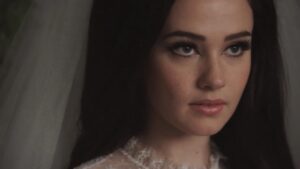Cinema is musical. When well-wielded, the language of film—rhythmic and lyrical—demands to be heard as well as seen. In the first moments of Waves (2019), a camera spins within the sacred enclosure of Tyler’s (Kelvin Harrison Jr.) car, his girlfriend Alexis (Alexa Demie) extending her arms out the window. In the diegetic background, an Animal Collective song plays. It is the first of many pop culture references—Kanye West, Kendrick Lamar, and Frank Ocean will all have their time.
Talking about the movie in a screening Q&A at the National Museum of American History, director Trey Edward Shults said, “I think being in a car at that age with the person you love can be the ultimate freedom.” He is describing how everything about the filmic grammar of Waves, from the constant needle drops, to the changing aspect ratio, to the camera movement, was designed to immerse us in the minds of the teenagers.
The dizzying opening image is an introduction to the off-balance, nausea-inducing first chapter of the film. Out in suburbia, we see Tyler drifting from day to day in a bubble of youthful invincibility, through tiny vignettes of visceral wrestling practices, glaring bonfires, and blurry after-party nights. The south Florida setting and beautiful color grading (begging comparison to Barry Jenkins’ Moonlight (2016) conceal a darker truth: just how close to the verge of collapse Tyler’s world is.
A series of escalating bad discoveries disorients Tyler, his judgment clouded by pressure from his dogmatic father (Sterling K. Brown) to work ‘ten times harder’ and fear of a life-altering decision made by his girlfriend. Feeling helpless, Tyler turns inward, expressing himself through bursts of frustration and cruelty, careening toward a traumatic catastrophe which explodes onto the screen halfway through the runtime of the film.
Then, like a record, Waves is flipped to the B-side. Tyler’s younger sister Emily (Taylor Russell) emerges from the margins of Tyler’s story, coping in the residuum of his actions. Everything screeches to a halt; whereas Tyler’s chapter was brooding and violent, this chapter—Emily’s chapter—is reflective and tender. She meets Luke, played by a lovably awkward Lucas Hedges. Tense, fleeting scenes become lingering long shots. The audience can breathe again.
The ghosts of words unspoken haunt Emily’s half: would things have unfolded differently if she had reached out to the person just on the other side of her bedroom’s connecting door? In one touching scene from the first half, Tyler sobs on the floor of the bathroom in between their two rooms. Emily comes to comfort him, but few words are exchanged between the two—drunk and upset, Tyler finds it impossible to voice how he feels.
Authentically representing the way teenagers communicate is a daunting task that Waves tackles with sporadic success. Portraying emotion through the screen of a cell phone, though illustrative of modern love, can be difficult to do convincingly—in Tyler’s chapter, an over-text breakup is treated as calamity, half heart-breaking, half laughable. In Emily’s chapter, however, Shults finds more subtlety. Emily types out a phrase, deleting it before it can be sent to her step-mother: ‘I want us to be a family again.’ There’s no lingering humor, only the bittersweet relatability of wording and rewording and fixating over confessional texts.
Emily’s chapter is about forgiveness: of Tyler, of their father, and of Luke’s abusive, alcoholic father dying of cancer. Like her unsent text reveals, any resentment she holds onto comes second to her desire for familial reformation. Shults consistently centers his films around dysfunctional, even volatile family units. In the likewise kin-driven Krisha (2015) and It Comes at Night (2017), families are nuclear, tight-knit yet distant, sowing their own explosive destruction. What separates Waves from the rest of his filmography is the way in which these characters manage to come together again in the ashes.
Waves, in particular, was autobiographical for Shults. From the scars on his shoulder from high school wrestling, to the fraught relationship between his own parents, Shults’ life uncannily echoes Tyler’s. Other parallels take shape as well—similar to Luke’s story, Shults’ father died in Missouri of pancreatic cancer, and he was only present because his girlfriend pushed him to go. Shults’ closeness to the material is both a blessing and a curse; the characters feel worn and multidimensional, but Shults, who carries the baggage of his own lived experiences, tends to offer unambiguous answers to the ambiguous questions raised. Waves is desperate to forgive and reach cathartic ends, sometimes at the expense of authenticity.
Waves is exhausting. It crashes over you—thunderous and powerful, with fluid camera movements and the continuous soundtrack flowing from one scene to the next—then retreats, leaving you bowled-over in its wake. Shults lays the sentimentality on thick, but through his masterful creation of tension and release, it’s impossible not to feel every moment: the high highs and low lows, ebbing and flowing with the contours of Tyler’s and Emily’s lives.






